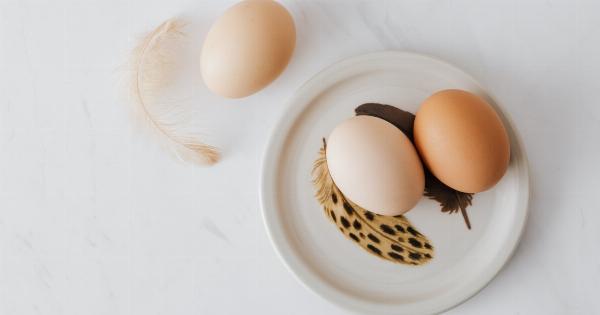Many of us start our day with a steaming cup of coffee. Whether it’s to jumpstart our mornings or keep us going throughout the day, coffee has become a staple in most people’s lives.
But have you ever wondered how coffee affects your cholesterol levels? In this article, we will explore the facts behind this popular beverage and its relationship with cholesterol.
The Link Between Coffee and Cholesterol
Before delving into the specifics, it’s important to understand what cholesterol is and how it impacts our health. Cholesterol is a waxy, fat-like substance that is present in all cells of the body.
It plays a vital role in the production of hormones, vitamin D, and bile acids that aid in digestion.
There are two main types of cholesterol: low-density lipoprotein (LDL) and high-density lipoprotein (HDL). LDL cholesterol is often referred to as “bad” cholesterol as it can build up in the arteries, leading to heart disease.
On the other hand, HDL cholesterol is known as “good” cholesterol because it helps remove LDL cholesterol from the bloodstream, reducing the risk of heart disease.
Now that we have an understanding of cholesterol, let’s dive into how coffee affects it. Studies have shown that consuming coffee, especially in moderate amounts, does not significantly raise LDL cholesterol levels.
In fact, some research even suggests that coffee may have a protective effect on heart health.
The Role of Coffee Compounds
Coffee is a complex brew that contains various compounds, including caffeine, antioxidants, and diterpenes. These compounds have been the subject of numerous studies investigating their impact on cholesterol levels.
Caffeine, the most well-known compound in coffee, has been found to have minimal effects on cholesterol. While it may slightly raise LDL cholesterol in some individuals, the overall impact is considered negligible.
However, it’s worth noting that caffeine can affect cholesterol differently depending on the individual’s genetic makeup.
The antioxidants found in coffee, particularly chlorogenic acid, have been linked to potential cholesterol-lowering effects. These antioxidants help reduce inflammation and oxidative stress, which are key factors in the development of heart disease.
Studies have shown that consuming coffee, which contains these antioxidants, may contribute to a modest decrease in LDL cholesterol levels.
Diterpenes, such as cafestol and kahweol, are natural compounds found in coffee beans. These substances have been found to raise cholesterol levels, specifically LDL cholesterol.
However, the impact of diterpenes on cholesterol depends on the brewing method. Filtered coffee, which is commonly consumed in many countries, helps to trap these compounds, preventing them from entering the final beverage.
As a result, the potential increase in LDL cholesterol from diterpenes is minimal when drinking filtered coffee regularly.
Moderation and Individual Differences
While the overall evidence suggests that coffee consumption in moderate amounts does not have a significant impact on cholesterol levels, it’s important to consider individual differences.
Some individuals may be more sensitive to the effects of coffee on cholesterol, especially if they have certain genetic variations.
It’s also essential to be mindful of how you consume your coffee. Adding cream, sugar, or other high-fat ingredients to your cup can contribute to higher levels of LDL cholesterol.
Opting for healthier alternatives like low-fat milk or natural sweeteners can help mitigate any potential effects.
Furthermore, moderation is key. Just like with any food or beverage, consuming excessive amounts of coffee can have negative health consequences.
It’s generally recommended to limit coffee intake to a moderate level, which is typically defined as 3-4 cups per day.
The Benefits of Coffee
While the effects of coffee on cholesterol are relatively minimal, this popular beverage offers various other health benefits. Some of these benefits include:.
1. Antioxidant Powerhouse
Coffee is rich in antioxidants that help fight inflammation and reduce the risk of chronic diseases like type 2 diabetes, liver disease, and some types of cancer.
2. Enhanced Cognitive Function
The caffeine in coffee acts as a stimulant, improving alertness, attention span, and overall cognitive performance.
3. Mood Booster
Coffee has been linked to a reduced risk of depression and an overall improvement in mood. The caffeine may enhance the production of neurotransmitters that regulate mood, such as dopamine and serotonin.
4. Lower Risk of Parkinson’s Disease
Multiple studies have found that coffee drinkers have a lower risk of developing Parkinson’s disease, a neurodegenerative disorder affecting movement.
5. Reduced Risk of Stroke
Moderate coffee consumption has been associated with a lower risk of stroke and a decreased likelihood of developing cardiovascular diseases.
It’s important to note that these benefits are typically associated with moderate coffee consumption and should not be used as an excuse to overindulge in excessive amounts of caffeine.
Conclusion
Coffee, a beloved beverage for many, has a minimal impact on cholesterol levels, particularly LDL cholesterol. While diterpenes found in coffee beans can raise LDL cholesterol, drinking filtered coffee significantly reduces their presence.
Additionally, the antioxidants present in coffee may have a cholesterol-lowering effect. Ultimately, moderation is key when it comes to coffee consumption, and individual variations should be taken into account.
As long as you enjoy your cup of joe in moderation and pay attention to the extras you add, you can continue to savor the many benefits that coffee has to offer without worrying about its impact on your cholesterol levels. Enjoy that morning brew!.





























